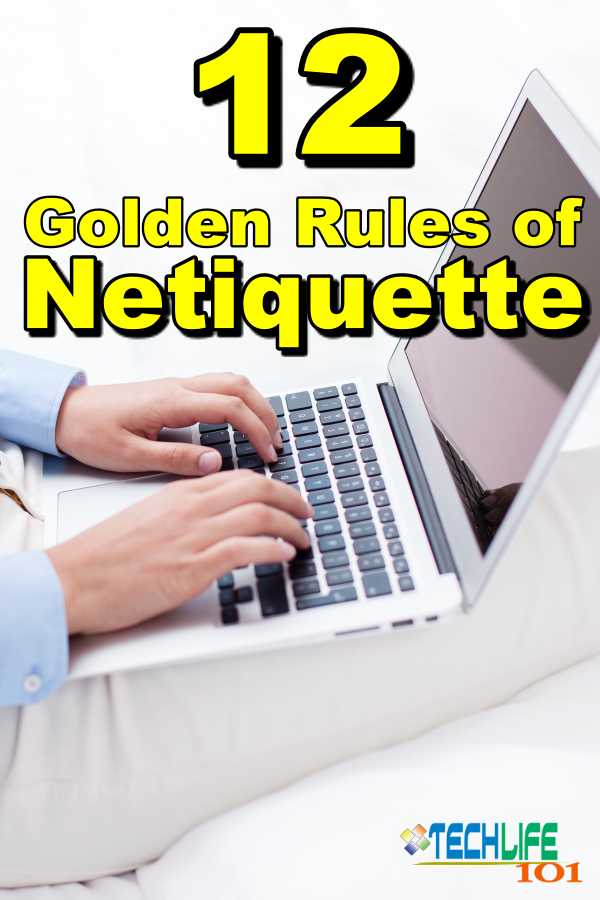Here is my list of the 12 Golden rules of Netiquette. Netiquette is the combining of 2 words (internet-etiquette) and is the correct way of communicating on the Internet.

Our society needs rules in order to function correctly and our Internet is no exception.
Like any environment that is shared with others, a certain standard is expected and must be followed.
Can you imagine our society without rules. Or how about our highways? When everyone just cares about their own interests, traffic halts and crashes become the norm.
This is the same on the information highway. When we fail to follow the social standards of netiquette, we crash with other people and chaos persists.
Unfortunately, I have seen too many people break these rules in an attempt to have fun or make themselves look better at someone else expense.
Doing this only reveals the senders character flaws and always has the opposite desire then originally expected. To avoid possible embarrassment and revealing your character flaws, I have created this list of 12 golden rules of netiquette we all need to follow to have a safe trip across the Internet. Lets get started.
Think Before You Type
Then in doubt about the rules, all you need to do is T-H-I-N-K before you type anything.
THINK is an acronym that takes the letters of the word think and creates a list of rules to follow before sending any message on the Internet.
It asks you to make sure the message is True, Helpful, Inspiring, Necessary, and Kind. If it is all 5, its OK to hit send.

Golden Rules of Netiquette
You really should be doing all 12 of these golden rules of netiquette every time you sent any message out. Politness is not optional in society and it is not optional on the internet either.
Always Make a Great Impression
When you are meeting someone for the first time, it is natural to try and make a good impression and give them every opportunity to like you. This is also true for meeting someone online.
I promise you there is one life lesson that will come to you over and over. The world is a very small place and you will meet your online social group over and over. If you want to benefit from the relationship, then make a great impression over and over again.
People are always looking for ways to make your online interactions more human and emoticons are one such way to express yourself in a personal way.
The issue is over use of emotions or emoticons can be seen as unprofessional. I highly recommend using them, even in a professional environment, but very limited and only when appropriated.
Always Help the Newbies
It is harder and harder to find a Internet newbie these days but helping should be extended to anyone who needs it, not just the newbies.
When you see someone not following the 12 rules, feel free to gently point them to this article and teach them the correct netiquette to follow. Over time, everyone will learn the rules and mistakes will be reduced dramatically.
Always Be Quick to Forgive and Move On
The lack of maturity is a huge cause for most of the breaches of netiquette.
I promise you there is little to gain in participating in a flame war with the childish behavior and it is in your best interest to forget it and move on.
The longer you hang on to hurtful comments and flame messages, the more it will hurt you, which is very likely the intent of the flame message in the first place.
Take the power away from the message and troll and forgive them for sending it and move on with your life. You will always be happier for doing so.
If you Wouldn’t Do It in Real Life, Don’t Do It Online
We have one life and one personality, so why should we ack any different in real life or our cyber life. We shouldn’t!
If we are people of good character, then we just need to be ourselves.
Remember, there is little anonymity online even though we tend to think there is. Anything we do online can and will come back to hurt us in the end.
If you wouldn’t show it in public, you shouldn’t share it online. The things online will remain there forever. Everything is stored and retrievable, so protect yourself from yourself and keep your private life private.
Don’t exclude people or talk behind their backs. This is a matter of trust. If you talk behind other peoples backs, you are invertible giving them permission to talk behind your backs. Show everyone this is not acceptable by your actions and they will follow suit.
Respect People’s Time and Privacy
The Internet has become a great source for information. It is the single best place to learn new things and just about any question you want to ask has already been asked and answered.
The answer just required a little looking.
Before you ask someone else a question, you should have spend at least 15-30 minutes looking for the answer yourself. If you are a Internet Newbie, then give yourself more time to find the answer.
Learning how to get the answer yourself will greatly increase your ability to learn.
Remember the saying, “Give a man a fish, and you will feed him for a day. Teach a man to fish, and you will feed a man for a lifetime”.
Take the time to research your question before you waste someone’s else with your work.
Also remember, you should put into the Internet more then you take out.
This means you should answer other peoples questions just as often as you ask someone to answer your question. What goes around, comes around.
Always be Clear and Understood
Dave Ramsey has a motto in his company, “To be Unclear is to be Unkind”. What is the point of writing a message that is unclear only to be misunderstood.
Unclear messages are any message that can be misinterpreted by the reader. This happens often by misspelled words, unclear messages, and poor choice of words.
Spell check can often be a great savior when it comes to misspelling, but it can create a world of misunderstanding when the auto correct replaces mistyped words with completely different ones.
Always read over your message carefully before sending.
Did you know, when you type in all caps, the message is often interrupted as yelling or shouting?
Unless you are in an organization when the norm is to always use capitalized letters (like the military), please always use sentence case.
Physical People Take Priority
When you are in the presence of both real physical and online people, the people you are actually with should always take priority with your attention. Put the phone away.
You are human and humans require real, physical contact with other, real, physical people. Your digital friends cannot fill that need.
There are countless articles that talk about the wellness benefits of interacting with real people and every time you take your phone out, you are reducing the emotional benefits of sharing time with other people.
Be mindful of the things around you and enjoy the time spent with your friends and family. In the long run, you will be very glad that you did.
Be Respectful
This is probably one of the most important of the 12 golden rules of netiquette.
Always be respectful.
The error most people make is conversations over the Internet are rarely one to one, and you need to consider the social, cultural, and language differences of the whole world when sending a message.
This is near impossible to know and create messages that are globally acceptable. When in doubt, if you are being very respectful to your reader, your message will likely be globally acceptable.
As a writer, I am always very respectful for other people’s work (copyrights). Never use someone’s words, images, or ideas without their permission. Its just the right things to do.
Never name-call or express offensive opinions in anyway. Imagine your Internet group are your family sitting around your table for a holiday meal. Have your online conversation the same way you will have your family dinner conversation and most of the time you will be OK.
Verify Facts Before Reposting
The TV show “House” has a famous line in it that makes it way into most shows. “People lie.”
People will always lie to you for one reason or another. Lately, the news is full of “fake News” articles and people are most often unable to tell what news is real or fake.
There are countless fake articles out there and I believe that more then 50% the information people are exposed to is not true but it is near impossible to get real numbers on this opinion.
The rule here is simple, never pass on any information to someone unless you can validate it from a reliable, truthful source, that the information is accurate.
Sorry to disagree with some people, but the US media is mostly honest and truthful and should not be considered “fake News”. You should validate the truthfulness of anything you send using the following sources.
- https://www.mediabiasfactcheck.com/
- https://www.politifact.com
- https://www.snopes.com
- https://www.factcheck.org
- https://www.npr.org
When creating articles, please always be honest and provide sources when stating facts or clearly mark any comment as your opinion. The more we get in the habit of checking sources, the more reliable the Internet will be for everyone.
Check Messages and Respond Promptly
By not checking and responding to messages promptly, you are showing disrespect to other people because you are telling them their message is not important to you.
The problem here is all about expectations and once they are set, you need to meet them.
I recommend you clearly set expectations about how often and when you check and respond to your messages and live up to your commitments. Then when you are not online, people will understand.
I should also add here that it is very healthy to unplug and spend time with friends and family as often as possible. Make sure to let your online social community know your schedule and enjoy some time off.
Remember Your Digital Footprint Can be Tracked
The problem is people feel a certain amount of anonymity when cruising the internet. Invisibility gives people a sense to push the boundaries of social norms in what they perceive as a safe, obscure way. Nothing can be further from the truth.

I recently finished a book called “The Art of Invisibility” by Kevin Mitnick when he writes about the hundreds of ways we are being constantly tracked online.
There are countless stories of people who have had their Internet world cause huge problems with their real world. Invisibility is very difficult to achieve and a false sense of security.
It is a best practice to always assume what you type and read online is always in public view and stored forever. This way you will not be surprised when your actions come back to haunt you later.
Do Unto Others as You Would Have Others Do Unto You
This is considered the most important of all the golden Rules of Netiquette. If you can remember just this one, you will greatly improve your Internet behavior and safety.
As a matter of fact, this rule clearly fits to both your physical and digital life. It’s a good one to live by in all cases.
If you treat everyone as you want to be treated, then you will know how to behave when you are questing how to apply the rules to a certain situation or condition. Pretend you are the reader and send accordingly.
Conclusion
This is my list of the 12 Golden rules of Netiquette and if you can follow all of them, you should never regret your Internet behavior.
As a bonus, here is a link to the 10 commandments of Internet behavior that is also good to know and follow but often will not apply as well as the 12 Golden rules of Netiquette listed above.
Please let me know if you agree with this list of the 12 golden rules of netiquette by leaving me a comment below. If you like the article, please consider signing up for my email list and be the first to hear about new articles. I write a new article once a week divided among all my websites and you will never be spammed or sold.
Thank you for reading and don’t forget to practice good netiquette.






